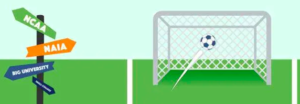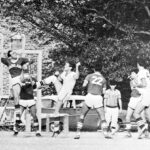Time to Reset the NCAA Eligibility Clock for Junior College Student Athletes?
Many believe that junior college student athletes are an essential part of the collegiate system. They provide a vital link between high school and university sports programs, and they also offer a chance for talented young athletes to develop their academic and athletic skills in a more structured environment. However, NCAA rules on eligibility are flawed and outdated and the “Eligibility Clock” needs to be reconsidered.
NCAA DI “5-YEAR ELIGIBILITY CLOCK” INFO TO KNOW BEFORE SCHOOL STARTS!

Academic Readiness
Many junior college student-athletes may struggle academically during their first year of college. This is not unusual, as the transition from high school to college can be challenging for many students. However, it is unfair to penalize these students by taking away two years of their eligibility where a 4 year or professional degree can be attained simply because they were not as academically mature as other students.
READ: What to Know About Going Junior College
Emotional Readiness
The maturity gap between high school and college can also be a factor in a student athletes’ decision to attend junior college. Many students may not be emotionally or mentally ready for a four-year institution right out of high school. Playing a Junior college can provide a safe and supportive environment for these students to develop their independence and decision-making skills before transferring to a larger university.
US Soccer Student Athletes Have an Additional Barriers
The Eligibility Clock was established without consideration for potential high school soccer recruits and long before its rise in popularity in the NCAA. No other sport has grown in presence at the high School or college level over the last 30 years like soccer, and no other sport has so much competition from international student athletes from professional sports academies.
READ: US SOCCER RECRUITS LOSING OUT TO EUROPEAN COMPETITION.
US soccer has grown in both popularity and in professionalism and colleges have responded from about 100 4-year Schools offering soccer in 1981 (wiki) to over 1,200 in 2023. Yet, although with the river of US soccer players swelling, the channel to play college soccer is narrowing further due to foreign player involvement. According to the NCAA, 1/3 of the players at 4-year colleges are from abroad who are oft times older with more physical advantages, and have better economic resources.
By taking away two years of eligibility from a US Soccer Player in particular, the NCAA is further contributing to an even more unfair playing field.
Economic Inequities
Many junior college student athletes come from low-income families and cannot afford to attend a four-year university and opt for Junior colleges. They offer an affordable alternative for these students, allowing them to continue their athletic careers while also receiving a quality education. Taking away two years of eligibility from these student-athletes would further disadvantage them economically, as they would have fewer opportunities to earn scholarships and pursue professional careers.
There are an array of complex factors that may influence a student athletes’ choice to attend a junior college. Academic readiness, emotional needs, economic status, and physical maturity to name a few. So, instead of penalizing a student athlete for making a good decision to study and play at a JUCO, we should encourage and support them by resetting the eligibility clock to zero hour.


